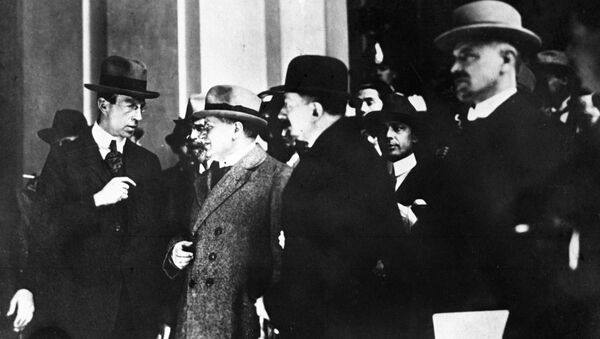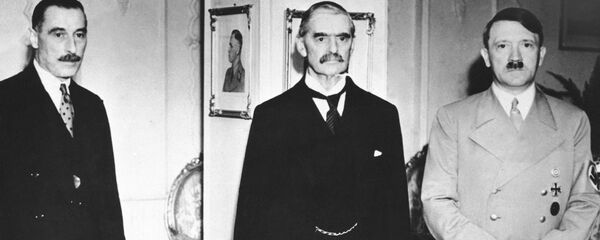When did Western Russophobia begin to take root? Was Russophobia a "state-sponsored" project or did it develop naturally? Has Russia earned the distrust?
Michael Jabara Carley: The intense Russophobia of the 19th century had at its base a British preoccupation with Russia's perceived threat to British interests in western and central Asia (Turkey, Persia, Afghanistan), the contested borderlands between Russia and British colonial holdings. In the 19th c. public opinion, unless it was the revolutionary masses attempting to seize power, was limited to privileged elites and those who read newspapers and books. Of course this meant more and more people as the century progressed.
So, basically, you could say that most public opinion was "state-sponsored", by one part of the British elite or the other. I don't know what you mean by Russia "earning distrust". Russia was a great power and as such sought to protect its interests as they were perceived by the tsarist autocracy, a very powerful elite though it represented only a small part of the population in general which was mostly serf until the 1860s and peasant afterward. As a matter of fact I remember a comment from Stalin to the effect that the tsars had done very well in defending Russian national interests and in acquiring the territories that made up the Russian state in 1914. Stalin only needed to do housecleaning in effect to reacquire territories lost during the First World War and civil war. In weakness Russia tends to contract; when strong, it expanded to occupy what might be called the spaces of a Greater Russian state. This is just the danger which 19th century Britain feared.
Historians remark that Russia was regarded by some Western European powers as a potential "Lebensraum" (with natural resources). Was their anti-Russian attitude just a smokescreen to justify warmongering ambitions?
Michael Jabara Carley: "Warmongering ambitions" is rather polemical, not the terminology I would use unless speaking about Nazi Germany, and even then I would refer to Hitler's Mein Kampf, his blueprint for German domination of Europe and his intention to make war to acquire lebensraum in Eastern Europe and European Russia. Prior to 1914, Russia might be termed half great power, half dependency of the European states. Russia was an open field of investment in banking, industry, resource extraction; it provided important markets for manufactured goods and a rich source of supply of natural resources and agricultural products.
The Bolsheviks knew what was in store, if Soviet power was overthrown, and the revolutionary movement became in fact the defender of Russian sovereignty and independence whatever its claims to lead a world revolutionary movement. In their propaganda messages to the Soviet peoples the Bolsheviks took up nationalist themes against the Entente interventionists and against Poland in 1920 when the latter launched an offensive in April intended to seize Kiev and re-establish Poland's frontiers of 1772. It was a resumption of the Polish-Russian struggle for control of the Byelorussian and Ukrainian borderlands. After the end of the foreign intervention and the stalemated war with Poland, the Soviet government had to rebuild the ruined Russian economy and needed to trade and borrow in the west. The US, Britain, France, yes, you know, the same old gang, thought they could impose their conditions on Moscow and re-establish their domination of the Russian economy.
It's never wise to enter Russia carrying a sword. Remember the false Dmitrii, Charles XII, Napoleon, amongst others: it's a long list. President Putin won't cite Stalin, of course, but he understands the principle very well which is why he is trying to strengthen the Russian economy and to reorganize and strengthen Russia's armed forces.
Some experts suggest that the Western political establishment and banking elite contributed a lot to the regime change in February 1917 in Russia known as the February Revolution. These experts also note that the Provisional Government was acting in the interests of the West. Is this assumption correct? Can we say that the Bolsheviks undermined the Western elite's plans and that the October Revolution of 1917 in some way prevented the West from further interfering in Russia's domestic affairs?
Michael Jabara Carley: Actually, the Entente powers could see the 1917 February revolution coming and feared it. I don't think it is correct to accuse them of fomenting the February Revolution. It was women demonstrators demanding bread and the garrison soldiers of Petrograd who brought down the tsarist autocracy. Afterward the Entente powers hoped for the success of the conservative politicians and faux socialists of the Provisional Government and then of the Kornilov putsch to thwart the development of the revolutionary movement.
They even had contingency plans to buy peace with Imperial Germany at Russian expense. It was only after the October Revolution that the Entente got busy trying to bring down the Soviet government by supporting various nationalities and Russian White Guards with money and arms and by direct military intervention. Western brokered "color revolutions" and "airstrike democracy" of the present day are nothing new. Indeed, it was the same perpetrators, the US, Britain, and France, trying to impose their will on Soviet Russia. As I said above, the Soviet government became the main defender of Russian sovereignty and independence, and you can see evidence of it in Soviet propaganda posters of the civil war period.
25 years after the collapse of the USSR Russophobia has got a second wind. Can we say that the Western establishment view Russia as a potential competitor in the economic, military, ideological spheres, especially in light of Russia's successful advance in Syria?
Michael Jabara Carley: I don't think Russophobia has got a second wind; I think it has always been present. When Russia is weak and compliant, Russophobia goes into remission. Weak Russians, like Boris Yeltsin for example, were received in the west as buffoons, good for a laugh. Just given ‘em a little vodka and let them dance for us. They're not threatening. When Russia becomes strong, Russophobia erupts again.
The West has had things its own way for several centuries now, and having got used to domination, it does not like what its views as interlopers. As I have said, Western men of power fear and hate subjected "others" who depart from their assigned roles as bowing servants. They are dangerous and have to be reminded of their place. The West of course has misunderstood Putin who has no interest whatsoever in threatening anyone (apart from IS terrorists) and only wanted to integrate Russia politically and economically into Europe as a European state, without of course becoming a US satellite.
The Americans resent Putin's presumptuous idea that Russia should be strong and independent again, and so they have tried to administer lessons of various sorts, like sanctions, to take Putin down a peg, show him his place… and Russia's place. Russian assistance to the Syrian government in fighting Jihadi marauders, effectively backed by the US and its various vassal states, is yet another example for Washington of Putin's presumption. It gets personal in Washington where the American deep state siloviki are trying to figure out ways to get ‘round the predicament into which Putin has now placed them in Syria. They've been caught red-handed backing the Salafist Jihadis.



